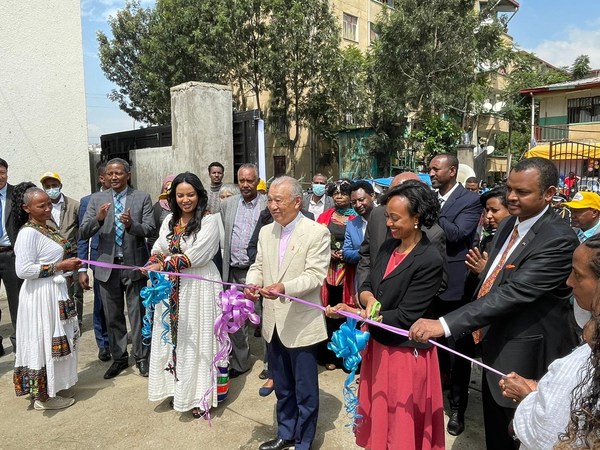TOKYO, Sept. 2, 2022 /PRNewswire/ -- Sasakawa Health Foundation has funded the construction of a building in Addis Ababa for the Ethiopian National Association of Persons Affected by Leprosy (ENAPAL).

Minister of Women and Social Affairs Dr. Ergoge Tesfaye (left), WHO Goodwill Ambassador for Leprosy Elimination Yohei Sasakawa (center), Minister of Health Dr. Lia Tadesse (right)
The building, which ENAPAL plans to use as its headquarters in future, will enable the organization to operate on an independent footing and stand as a symbol of dignity and hope for a long-marginalized community.
An opening ceremony was held on Sept. 2 in the Ethiopian capital attended by dignitaries including Ethiopian Minister of Women and Social Affairs Dr. Ergoge Tesfaye, Minister of Health Dr. Lia Tadesse, and WHO Goodwill Ambassador for Leprosy Elimination Yohei Sasakawa.
The five-story building was erected on land donated by the Ethiopian government, with Sasakawa Health Foundation, a Tokyo-based NGO, covering the cost of construction.
Founded in 1996, ENAPAL is a community-based organization with over 20,000 members dedicated to securing full participation and equal opportunity for persons affected by leprosy in Ethiopia. The country reported over 2,500 new cases of leprosy in 2020 and is designated by the WHO as one of its 23 global priority countries for the disease.
To date, ENAPAL's activities have been supported largely by Sasakawa Health Foundation and other international NGOs working in the leprosy sector. But with the completion of the new building, ENAPAL looks to secure a stable source of income by leasing the premises to an educational institution and operating self-sustainably.
ENAPAL first approached the Ethiopian government around 2011 about the possibility of receiving land for a new headquarters. Six years later, the government transferred a 1,500-square-meter plot to the organization, the first case of its kind in Ethiopia involving a local NGO.
On a visit to Ethiopia in July 2018, Goodwill Ambassador Sasakawa was asked by ENAPAL to support the project. After surveying the plans, Sasakawa Health Foundation agreed in 2019 to underwrite the construction costs.
The presence at the opening ceremony of the country's two cabinet ministers underlines the importance attached to this project within Ethiopia as well as the hope that the new building and its income-generating potential can serve as a model for leprosy organizations in other countries.
The day before the ceremony, a symposium on the theme "Don't Forget Leprosy" was held with the participation of government officials, NGOs and other stakeholders involved in the leprosy sector.
"Don't Forget Leprosy" is a campaign launched in 2021 by Sasakawa Leprosy (Hansen's Disease) Initiative to ensure that measures against leprosy are not neglected amid the COVID-19 pandemic. The Initiative is a strategic alliance between the WHO Goodwill Ambassador for Leprosy Elimination, Sasakawa Health Foundation and The Nippon Foundation.
Since 1975, the two foundations have supported the national leprosy programs of endemic countries through the WHO, with funding totaling some US$200 million to date.
About Leprosy
Leprosy, also known as Hansen's disease, is an infectious disease that mainly affects the skin and peripheral nerves. Prior to the COVID-19 pandemic, which disrupted case-finding activities, over 200,000 new cases were being reported annually. Leprosy is curable with multidrug therapy, but left untreated can result in permanent disability. An estimated 3 to 4 million people are thought to be living with some form of disability as a result of leprosy. Although completely curable, many myths and misunderstandings surround the disease. In various parts of the world, patients, those who have been treated and cured, and even their family members continue to be stigmatized. The discrimination they face limits their opportunities for education, employment and full participation in society.










